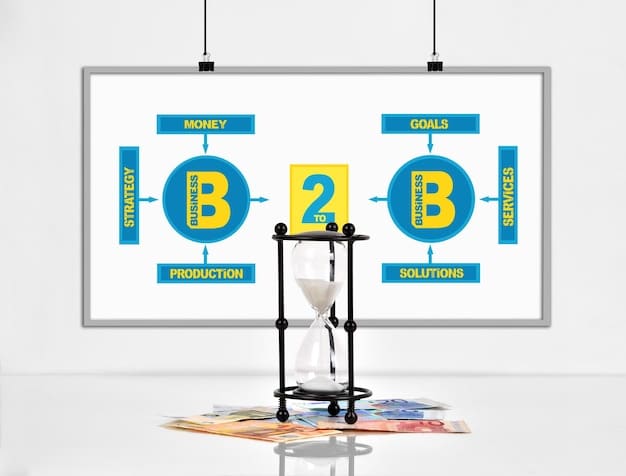Is Debt Consolidation Right for You? 2025 Interest and Fee Analysis

Debt consolidation involves combining multiple debts into a single new loan, potentially offering advantages based on 2025 interest rates and fees, but its suitability depends heavily on individual financial circumstances and careful evaluation of all associated costs.
Navigating the world of debt can be overwhelming. Is Debt Consolidation Right for You? A 2025 Analysis of Interest Rates and Fees aims to provide a clear and concise overview to help you determine whether consolidating your debts is the right financial move for you.
Understanding Debt Consolidation in 2025
Debt consolidation involves taking out a new loan to pay off existing debts. This can simplify your finances by reducing multiple payments into one. Understanding how it works in 2025 is crucial given changes in interest rates and lender fees.
The Basic Mechanics of Debt Consolidation
Essentially, you’re replacing several debts with a single one. This new debt ideally has a lower interest rate or more favorable terms. The goal is to make repayment more manageable and potentially save money over time.
Types of Debt Commonly Consolidated
Typical debts consolidated include credit card debt, personal loans, and sometimes even medical bills. The feasibility of consolidating certain debts may depend on the lender’s specific offerings and your credit score.
- Credit Card Debt: High-interest credit cards are prime targets.
- Personal Loans: Consolidating these can lower your monthly payments.
- Medical Bills: Can be consolidated if they’re affecting your credit.
- Student Loans: Federal and private student loans have specific consolidation programs.
In 2025, many lenders offer online tools to estimate potential savings, making it easier to compare options and understand the overall impact of debt consolidation on your financial health.

Analyzing 2025 Interest Rates for Consolidation
The interest rate on your consolidation loan is a key factor. If the new rate is higher than your current average, consolidation might not be beneficial. Let’s delve into what affects these rates in 2025.
Factors Influencing Interest Rates
Your credit score is the most significant factor. A higher score typically means better rates. The overall economic climate, including the Federal Reserve’s policies, also plays a role.
Comparing Fixed vs. Variable Interest Rates
Fixed rates remain constant over the life of the loan, providing predictability. Variable rates can fluctuate, potentially saving you money if rates drop but also posing a risk if they rise.
- Credit Score: Significantly impacts the rates you’ll qualify for.
- Loan Term: Longer terms usually mean lower monthly payments but higher overall interest.
- Economic Conditions: General economic trends affect prevailing interest rates.
- Lender Type: Banks, credit unions, and online lenders offer varying rates.
Carefully consider your risk tolerance and the potential for interest rate changes when choosing between fixed and variable rates. In 2025, it’s more important than ever to be informed of economic forecasts.
Decoding Consolidation Fees in 2025
Beyond interest rates, be aware of the fees associated with debt consolidation. These can add to the overall cost and offset any potential savings. Understanding these fees is essential.
Common Fees to Watch Out For
Origination fees, balance transfer fees, and prepayment penalties are common. Always read the fine print to fully understand what you’re paying.
How Fees Impact the Overall Cost
Fees can significantly increase the total amount you pay over the life of the loan. Factor them into your calculations when deciding if consolidation is worth it.
- Origination Fees: Charged upfront for processing the loan.
- Balance Transfer Fees: Apply when transferring balances to a new credit card.
- Prepayment Penalties: Charged if you pay off the loan early.
- Annual Fees: Some cards or loans may have an annual fee.
In 2025, many lenders are becoming more transparent about fees, but it’s still crucial to ask detailed questions and compare offers carefully to avoid any hidden costs.
Assessing Your Financial Situation
Debt consolidation isn’t a one-size-fits-all solution. Evaluating your personal finances is crucial. Consider your income, spending habits, and reasons for accumulating debt.
Understanding Your Debt-to-Income Ratio
Calculate your debt-to-income ratio to determine if you can comfortably manage the new loan. A high ratio may indicate you need to address underlying spending issues.
Evaluating Your Spending Habits
Address the root causes of your debt. If you don’t change your spending habits, you risk accumulating more debt even after consolidation.
Debt consolidation can be a strategic tool if used correctly. Assess your financial situation comprehensively before making a decision. Start by reviewing your credit report and understanding where your money is going each month.

The Pros and Cons of Debt Consolidation
Like any financial tool, debt consolidation has its advantages and disadvantages. Weighing these carefully can help you make an informed decision. Here are some key factors to consider.
Potential Benefits of Consolidating
Simplified payments, potentially lower interest rates, and a fixed repayment schedule are potential benefits. These can lead to reduced stress and improved financial stability.
Potential Risks and Drawbacks
Longer repayment terms, higher overall interest paid, and the risk of accumulating more debt are potential drawbacks. Be realistic about your ability to manage your finances.
- Pros: Simplified payments, potentially lower interest rates.
- Pros: Fixed repayment schedule, improved credit score over time.
- Cons: Longer repayment terms, higher overall interest if not managed well.
- Cons: Risk of accumulating more debt without changing spending habits.
Careful planning and financial discipline are essential to maximize the benefits and minimize the risks. In 2025, using budgeting apps and financial counseling services can be beneficial.
Alternatives to Debt Consolidation
If debt consolidation isn’t right for you, explore other options. There are numerous ways to manage debt. Look into balance transfers, debt management plans, and more.
Balance Transfers
Transferring balances to a credit card with a lower interest rate or a promotional 0% APR can save you money. However, watch out for balance transfer fees.
Debt Management Plans (DMPs)
DMPs offered by credit counseling agencies can help you negotiate lower interest rates and create a structured repayment plan. These plans typically involve monthly fees.
Consider all alternatives before committing to debt consolidation. Each option has its own pros and cons, and the best choice depends on your individual circumstances. Start by reaching out to a certified credit counselor for personalized advice.
Making the Right Decision in 2025
Deciding whether debt consolidation is right for you requires careful consideration. As we look at 2025, it’s crucial to stay informed on current rates and fees. A thorough understanding will help you make the right choice.
Steps to Take Before Consolidating
Check your credit score, compare offers from multiple lenders, and calculate the total cost of the loan. Don’t rush into a decision without doing your homework.
Seeking Professional Advice
Consulting with a financial advisor or credit counselor can provide clarity and personalized guidance. These professionals can help you assess your situation and make informed decisions.
Staying informed about the latest trends in interest rates and lender fees is essential. By taking these steps, you can confidently decide if debt consolidation is right for you in 2025.
| Key Point | Brief Description |
|---|---|
| 💰 Interest Rates | Crucial for savings; compare fixed vs. variable rates. |
| 📊 Debt-to-Income Ratio | Assess to ensure manageable loan repayments. |
| 🔎 Fees | Watch out for origination, transfer, and prepayment charges. |
| 🤔 Alternatives | Consider balance transfers and debt management plans. |
Frequently Asked Questions
▼
Debt consolidation combines multiple debts into a single new loan, simplifying payments. A new loan is used to pay off existing debts, ideally with a lower interest rate.
▼
Common debts include credit card balances, personal loans, and medical bills. Eligibility depends on the lender and the specific debts you hold. Student loans also can be consolidated.
▼
Your credit score is a major factor. Also, the type of loan (secured or unsecured), the loan amount, and prevailing economic conditions all influence interest rates.
▼
Risks include longer repayment terms, higher overall interest paid, and potential fees. Also, there’s the risk of accumulating more debt if spending habits don’t change.
▼
Alternatives include balance transfers to low-interest credit cards, debt management plans through credit counseling agencies, or even simply creating a tight budget and paying down debts aggressively.
Conclusion
In conclusion, determining if debt consolidation is the right move for you in 2025 involves carefully weighing interest rates, fees, your financial situation, and potential alternatives. Make sure to consider professional advice to ensure that you’re making an informed decision.





